Related Research Articles

A winery is a building or property that produces wine, or a business involved in the production of wine, such as a wine company. Some wine companies own many wineries. Besides wine making equipment, larger wineries may also feature warehouses, bottling lines, laboratories, and large expanses of tanks known as tank farms. Wineries may have existed as long as 8,000 years ago.
E & J Gallo Winery is a winery and distributor headquartered in Modesto, California. It was founded in 1933 by Ernest Gallo and Julio Gallo of the Gallo family, and is the largest exporter of California wines. It is the largest wine producer in the world, producing over 3% of the world's entire annual supply of 35 billion bottles with an annual revenue of $5.3 billion it is also the largest family-owned winery in the United States.
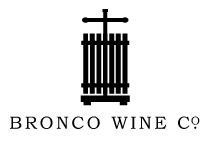
The Bronco Wine Company is a vintner that produces wines under many brands and is based in Ceres, California. It is the fourth largest producer of wine in the United States. Bronco Wine Co has an estimated 10,000 employees globally. There are 2 companies in the Bronco Wine Co corporate family.
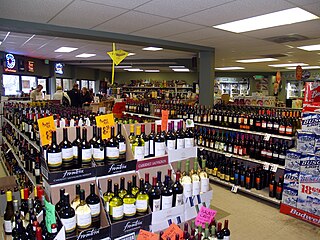
A liquor store is a retail business that predominantly sells prepackaged liquors, wine or beer, usually intended to be consumed off the store's premises. Depending on region and local idiom, they may also be called an off-licence, off-sale, bottle shop, bottle store or, colloquially, bottle-o, liquor store or other similar terms. A very limited number of jurisdictions have an alcohol monopoly. In US states that are alcoholic beverage control (ABC) states, the term ABC store may be used.
Granholm v. Heald, 544 U.S. 460 (2005), was a court case decided by the Supreme Court of the United States in a 5–4 decision that ruled that laws in New York and Michigan that permitted in-state wineries to ship wine directly to consumers but prohibited out-of-state wineries from doing the same were unconstitutional. The case was unusual because the arguments centered on the rarely-invoked Twenty-First Amendment to the Constitution, ratified in 1933, which ended Prohibition in the United States.

Wine has been produced in the United States since the 1500s, with the first widespread production beginning in New Mexico in 1628. Today, wine production is undertaken in all fifty states, with California producing 84 percent of all US wine. The North American continent is home to several native species of grape, including Vitis labrusca, Vitis riparia, Vitis rotundifolia, and Vitis vulpina, but the wine-making industry is based almost entirely on the cultivation of the European Vitis vinifera, which was introduced by European settlers. With more than 1,100,000 acres (4,500 km2) under vine, the United States is the fourth-largest wine producing country in the world, after Italy, Spain, and France.
Kendall-Jackson Vineyard Estates is a vineyard and winery, under the Kendall-Jackson brand, located in Santa Rosa, California in the Sonoma Valley wine country. As of 2010 Kendall-Jackson was the highest-selling brand of "super-premium" wine in the United States, often compared in blind tastings to 1er Cru wines of Volnay, Burgundy.

Although viticulture and the cultivation of grapes for table consumption has a long history in Japan, domestic wine production using locally produced grapes only really began with the adoption of Western culture during the Meiji restoration in the second half of the 19th century.
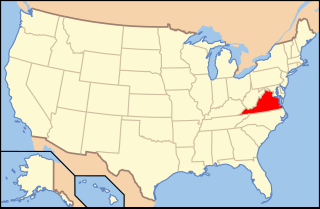
Virginia wine refers to wine made primarily from grapes grown in the commonwealth of Virginia. Wine has been produced in the area since the early days of European colonization in the 17th century. Virginia has hot humid summers that can be challenging to viticulture, and only within the last twenty years has the industry developed beyond novelty status. By tonnage, Vitis vinifera varieties represents 75% of total production. French hybrids varieties account for nearly 20% of total wine grape production in the commonwealth, while American varietals make up only about 5% of the total. As of 2012, the top 5 varietals produced are Chardonnay, Cabernet Franc, Merlot, Vidal blanc and Viognier.
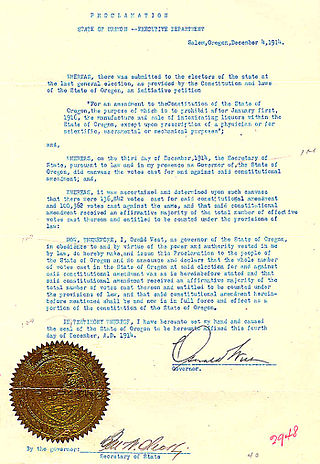
The U.S. state of Oregon has an extensive history of laws regulating the sale and consumption of alcoholic beverages, dating back to 1844. It has been an alcoholic beverage control state, with the Oregon Liquor and Cannabis Commission holding a monopoly over the sale of all distilled beverages, since Prohibition. Today, there are thriving industries producing beer, wine, and liquor in the state. Alcohol may be purchased between 7 a.m. and 2:30 a.m for consumption at the premise it was sold at, or between 6 a.m. and 2:30 a.m. if it is bought and taken off premise. In 2020, Oregon began allowing the sale of alcohol via home delivery services. As of 2007, consumption of spirits was on the rise while beer consumption held steady. That same year, 11% of beer sold in Oregon was brewed in-state, the highest figure in the United States.
Wine of the Month Club is the oldest sustained mail order wine club in the United States, having been founded in 1972 by Paul Kalemkiarian Sr. and succeeded in ownership by his son Paul Kalemkiarian Jr. in 1989. Located in Monrovia, California, the Club delivers two bottles of wine, one domestic, one international, to the doors of members nationwide every month, every other month, or every quarter. The Club aims to expose members to a broad range of grape varieties and wine regions. Those wines that are featured have had to endure a series of appraisals by the owner and cellarmaster Paul Jr., based on both their quality and their price. Ultimately, only twelve of 300–400 or so wines that are evaluated each month are selected. The club also offers wine gifts and made-to-order food and wine gift baskets. Along with wine shipments, customers are sent the Wine of the Month Club’s monthly newsletter which provides extensive background information for each of the featured wines.
Leeuwin Estate is an Australian winery and restaurant based in the Margaret River wine region of Western Australia.
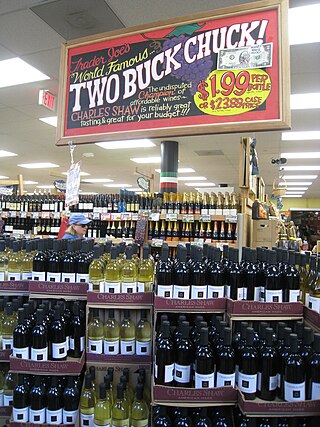
Charles Shaw is an American brand of bargain-priced wine. Largely made from California grapes, Charles Shaw wines include Cabernet Sauvignon, White Zinfandel, Merlot, Chardonnay, Sauvignon Blanc, Shiraz, Valdiguié in the style of Beaujolais nouveau, and limited quantities of Pinot Grigio.

The Court of Master Sommeliers (CMS) is an educational organisation established in 1977 to encourage improved standards of beverage service by sommeliers, particularly in wine and food pairing. From the court's inception through 2018, a worldwide total of 274 people have earned its Master Sommelier diploma, the highest level.

Lot18, defunct as of 2023, curates, markets and retails fine wine online. Lot18 has offices in New York, New York and Napa, California. Lot18 sells wines from around the globe. Lot18 also creates custom wines and brands, including Axiom, Mythmaker, Finial, Q8, Amukan, Loophole, and Neptune's Trident, among others.
Four Seasons Wines Limited is an Indian winery which was established in 2006, based in Bangalore, India. It produces wines from grapes grown around Sahyadri valley in Maharashtra. It is a subsidiary of United Spirits Limited (USL), which is itself part of the United Breweries Group. Four Seasons Wines manufactures and markets wines in India. It provides red, white, and rosé wines. Four Seasons Wines markets its wines under two brand names: Zinzi and Four Seasons.
Consilience Wines is a family-owned winery located in Solvang California and was established in 1994.
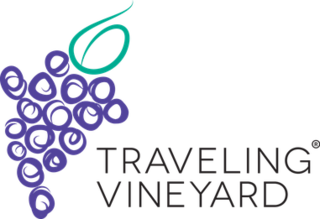
Traveling Vineyard is an American multi-level marketing company based in Ipswich, Massachusetts, that sells wine. The company was founded in 2001, and in 2010 it was purchased by Richard Libby and restructured.
References
- 1 2 J. Arnold & I. Larnis Wine Clubs of Sonoma County pgs 1-33 Pelican Publishing Company 2007 ISBN 1-58980-432-5
- ↑ Zimmerman, Martin, Los Angeles Times (August 23, 2009). "The time was ripe for a wine club". Los Angeles Times .
{{cite web}}: CS1 maint: multiple names: authors list (link) - ↑ Elena Brunet, The Wine Club, Latimes.com, 7 April 1990
- ↑ Dec 12, Matt Kettmann Wed; 2018 | 12:42pm (2018-12-12). "Wine Club Watch". The Santa Barbara Independent. Retrieved 2021-06-09.
- ↑ Lesley Berglund, Is Your Wine Club Healthy?, Winebusiness.com, June 2003
- ↑ Members only / Wine clubs have their privileges -- parties, perks and precious bottles, sfgate.com, 29 January 2012
- ↑ Tim Atkin, So what's the best wine club to join?, Theguardian.com, 9 October 2005
- 1 2 Liza B. Zimmerman, Sommeliers Step Into The Wine Club Game, Forbes.com, 10 April 2018
- ↑ Times Company Creating a Wine Club, Nytimes.com, 13 August 2009
- ↑ Paul Franson, California Warns Internet Wine Sellers, Winesandvines.com, 23 June 2009 (Archive)
- ↑ Lucy Shaw, Playboy launches wine club, Thedrinksbusiness.com, 20 September 2012
- ↑ John Kell, Martha Stewart Is Launching a Wine Company, Fortune.com, 5 April 2017
- ↑ Melissa Kravitz Hoeffner, NPR Launches Wine Club To Help Fund Public Radio, Forbes.com, 26 September 2016
- ↑ Tess Koman, Let Aldi Hire You To Drink And Give Opinions On All Of Their Wines, Delish.com, 24 May 2019
- ↑ Anna Escher, Haus raises $4.5 million to replace your wine club membership, Techcrunch.com, 30 January 2020
- ↑ Patrick Stroud, The precarious state of winery software, Bloom.wine, 4 February 2019
- ↑ Thomas Pellechia, E-Commerce And Wine Clubs Will Overtake Tasting Room Sales, Says New Survey, Forbes.com, 28 August 2019
- ↑ Kathy Stephenson, Utahns soon may be able to join wine clubs and bring back a case of liquor from out of state, Sltrib.com, 12 March 2020
- ↑ Whet Moser, Bruce Rauner’s Wine ‘Club’ Is More Like a Wine Dude Ranch, Chicagomag.com, 3 September 2014